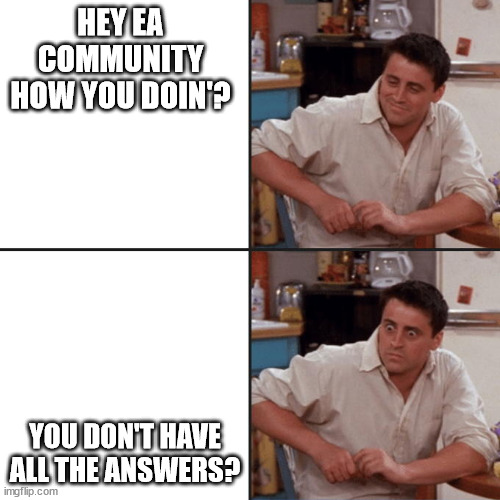All of Alex Barnes 's Comments + Replies
Great post! Thank you. I love that you are providing coaching for EAs who are aspiring for-profit, social enterprise and charity entrepreneurs.
We recently launched EA Angels to focus on EA entrepreneurs building for-profit startups who are ready to pitch to angel investment groups for funding.
Thank you for writing this! I really like the idea -- working on things with other people is messy and difficult and fun, but also a great way to build useful skills. The skill of understanding what skills you possess and what complementary skills others you work closely with possess seems valuable to develop
Thank you! Great analysis and synthesis of the Randomista and Systemista perspectives.
I hope you take a look at Lant Pritchett's new paper, Development Happened, Did Aid Help? If you find it intriguing, I encourage you to write an EA Forum post about it; your writing is concise and interesting.
Thank you for posting this! I've mentioned your post to people on the EA Supply Chain and Logistics Slack Group
Thank you for writing this! Someone recently shared with me the concept of Adverse Childhood Experiences (ACEs). I wonder if people with high ACEs scores find solace in EA
Thank you for posting these great explanations! I realized when explaining EA Angels to someone today that the main benefit of a successful for-profit startup is not always financial capital. After reading this, I think it might be the network and structural capital
I'm glad to hear you are passionate about the role of for-profit entrepreneurs in EA; the EA Entrepreneurs Slack Group might be of interest to you.
Regarding crop sustainability, Our World In Data's recent post digs into this: Increasing agricultural productivity across Sub-Saharan Africa is one of the most important problems this century
Congratulations! I find the Snowball Fund structure a little confusing, but I'm looking forward to sharing dealflow between the Snowball Fund and EA Angels. We've seen a couple of pitches so far from EA Entrepreneurs at EA Angels:
-EdTech (Europe) - no funding commitments
-FinTech (UK) - 2 funding commitments in discussion
And we have a couple more pitches in the pipeline to see in Apr/May:
-FinTech (Europe)
-RealWorldTech (USA)
My assumption is that there is probably room for several EA-themed funds, syndicates and Angel Investment Groups. At this point, the bo...
Yes! Connecting university researchers with Charity Entrepreneurship charities and other EA orgs could also be extremely valuable. I've helped informally connect the University of Toronto BioZone to a couple of different EA orgs. I don't think this is exactly what you are proposing, but supporting EA-aligned researchers to maximize their impact seems worthwhile.
Thank you for writing this! I appreciate the specific details and clarity. Although I'm not a Developer nor an employer of Developers, I do interact with a lot of Developers. Based on my experience, I think good Developers have a low tolerance for ambiguity -- the code can't "sort of" work and "maybe meet some" requirements. The code needs to work for specific use cases.
Likewise, honesty, transparency and clarity on behalf of potential employers is probably really helpful to Developers in understanding fit (or lack thereof).
Perhaps I'm completely wrong. I'm curious what Developers themselves think. Are there wildly chaotic, high tolerance for ambiguity Developers? Do they thrive in opaque surroundings?
I'm looking forward to the event!
A couple of related EA Forum articles:
Great post! Very informative. When I read,
About ⅖ of the charities each year exceed the cost-effectiveness of the strongest charities in their fields and have been supported by multiple independent funding bodies (Open Philanthropy, GiveWell, EA funds, etc.).
My initial reaction was, "a 40% success rate is too high!" I love that you are expanding and taking more risks.
My understanding from informal conversations is many CE charities would benefit from simple CRMs and a few from simple ERPs:
- CRM = Customer Relationship Management -- tracks interactions (outreach, etc)
- ERP = Enterprise Resource Management -- tracks transactions (cash, physical goods, purchase orders, etc)
Other EA orgs might have similar needs; a needs assessment might be a valuable project to undertake -- perhaps this has already been done?
Great idea! Museums and Science Centres seem promising.
Universities sometimes have specialized centres (examples: BioZone and Greater Good Science Center) and Student Investment Funds
Tourist Bureaus might be good resources to find listings of GLAMs
I realize this will sound crazy, but:
- Maybe bad mentors are even more important than good mentors
A good mentor will tell you smart things, you'll follow them, see good results and maybe think, "Wow! I'm so lucky to have a good mentor. I'll ask them about X, Y and Z." This reinforces the mentor-mentee dependency cycle
A bad mentor will tell you stupid things, you'll follow them, see terrible results and hopefully think, "Wow! That mentor was terrible. I'll ask someone else about X, Y and Z." This frees up the bad mentor to "help" others.
A bad ment...
I realize I'm super late to this discussion, but I strongly agree with the "Network Constrained" aspect. I've started running some experiments with EA Networking events:
- Adhoc events
- Monthly events
The basic idea is most people do networking wrong. They focus on themselves, talk about how amazing they are and then wonder why no one wants to hear about their cool project. My idea: let's put the Altruism back into Effective Altruism and help each other out. Questions to ask other participants:
- what can I do to help you succeed?
- who can I connect you with?
Admi...
Thank you Jonas for linking to this article on the EA Entrepreneurs Slack Group and thank you Paal, for tagging me in Slack to draw my attention to it.
Also, thank you for linking to What we learned from a year incubating longtermist entrepreneurship. I wasn't previously aware of this article. I would have been if I'd searched the EA Forum using The Entrepreneurship tag which:
covers posts that discuss entrepreneurial ventures, including nonprofit startups and for-profit startups founded with social impact in mind.
Simon Haberfellner and I talked yester...
Thank you for writing this! Two questions:
- When you factor in cost (money/time), does diaphragmatic breathing demonstrate the highest cost effectiveness?
- Recent meetings I've attended from groups such as Global Regenerative Colab and Zebras Unite have included breathing activities, possibly diaphragmatic breathing, is this something to consider including at the start of EA-related meetings?
On that second point, I'm thinking that if you spend 6 minutes (10%) of a 1-hour meeting on breathing, it could be a good use of time if the remaining 54 minutes are 11+% ...
Thank you for posting this!
This answer in the FAQ is really helpful for those of us with kids/other dependents:
Absolutely! If you have dependents you need to care for, you can definitely still attend the program and start an effective charity. We’ve had participants in the past who are new parents or who have had other family commitments. CE will provide financial assistance in the form of stipends for the duration of the program where required. We are all about supporting you to make it work.
Thank you for running an inclusive program that aims to me...
Thanks Ozzie! Glad to see I'm still welcome here!!
I'm sold on the idea of red-teaming (especially for EA and for red-teaming the idea of red-teaming itself). A few concerns:
- I have no idea where to begin to start working at red-teaming
- I have no idea if I'd even be any good at red-teaming
Sorry, maybe these concerns have already been covered really well and I missed it. Thanks!
Dear Aaron,
I don't think we share the same definition for the word "Retirement".
Sincerely,
-average humans everywhere
P.S. Thank you for all your help with the one serious EA Forum article I wrote. Despite you and Hauke's heroic efforts, it was still terrible. Related: did you pay 26 people to vote for it out of sympathy?
Maybe VCs use really sophisticated tools, but Angel Investors' most powerful tool is LinkedIn. It's amazing what you can learn about an industry by talking to smart, highly motivated people with years of experience. EAs probably under-use simple tools like LinkedIn, Zoom, AddEvent, calendly, etc
It's amazing how many EA groups don't have a paid Zoom account. Perhaps the process to get reimbursed involves too much paperwork. Maybe a high value project would be to focus on providing subsidies and funds to small EA groups with minimal hassle. You could call it "Give Directly for EA Groups"...
More Systems/Complexity aligned Slack Groups:
- EA Supply Chain and Logistics - classic stock and flow territory
- EA Entrepreneurs - successful startups are Complex Adaptive Systems
- EA Mental Health - one modality is called "Internal Family Systems"
Nice! Also, if you'd like to get started with Systems and Complexity, there is a Thinking in Systems Reading Group Slack. The book they are reading is Donnalea Meadows' classic Thinking in Systems
Lunchclub sucks. Their matching is terrible. I tried it a few times and quit. They have focused too much on monetization and not enough on a good user experience.
Calendly + EAs provide a good platform and community to build on. Feel free to use my calendly and LinkedIn and manually book meetings with other EAs who also have calendly, per Paul Graham -- http://paulgraham.com/ds.html



One person's Value Drift is another person's Bayesian Updating